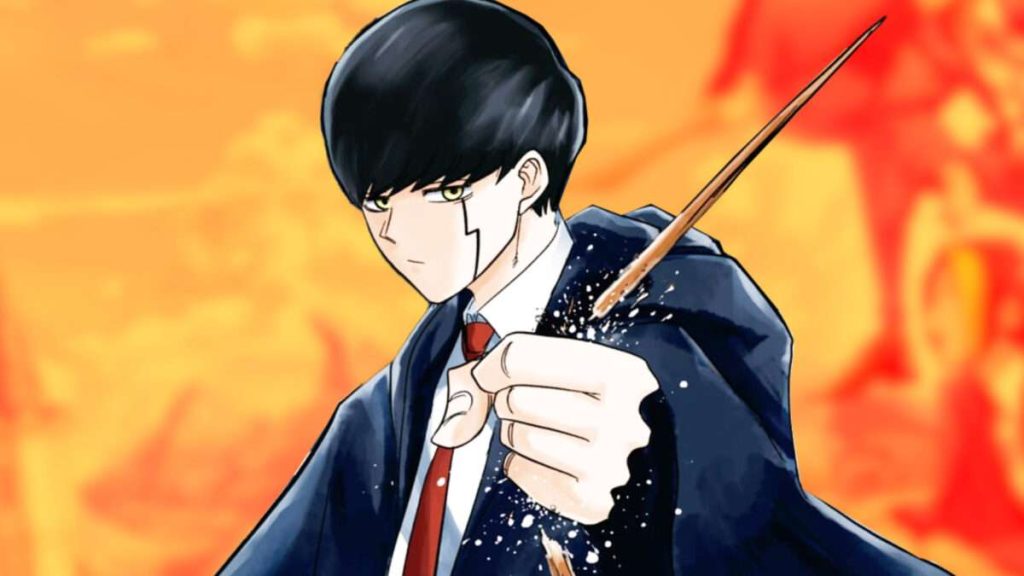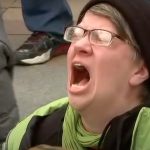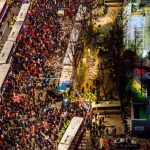What if human rights were dependent on magical ability?
That’s the premise behind the popular anime Mashle: Magic and Muscles. The series takes place in the Magic Realm, a fantasy world where one’s social standing is solely defined by magical abilities—and more magic means more political power. In the Realm, almost everyone is born with magical powers, but those with superior magic skills hold positions of authority. Status is demarcated by distinctive markings on people’s faces: An average person bears only a single line; three lines signify god-like powers.
A small portion of the Realm population, however, is born without any magical ability at all. Known as lackmagics, they are outcasts in the Magic Realm. Lackmagics are excluded from society and deemed unworthy of human rights. They face constant persecution and even threats of death, as the Realm’s government is intent on keeping humanity as magical as possible.
The show is funny and frequently absurd, but it’s also a pointed political metaphor. Beneath the humor, Mashle is a story about a broken society where magical ability defines one’s place in the world, and government-ordered discrimination not only results in the killing of innocents but also a society-wide disregard for nonmagical talents and abilities. It’s a show about rejecting top-down discrimination and learning to appreciate people for their individual abilities, even when those abilities don’t conform to social expectations.
The series follows a young man named Mash Burnedead, one of the detested lackmagics. He was born without an ounce of magic and raised in secret by an adoptive father who found him abandoned as a baby.
But his peaceful adolescence ends when he sneaks into town to buy cream puffs—his favorite dessert—and sparks an uproar when the townsfolk take notice of his unmarked face. Mash is confronted by a police officer determined to apprehend him, but his muscle power overwhelms the officer’s magic. Faced with this unprecedented scenario, the officer proposes a deal: Mash can protect his life if he enrolls in a magic academy and becomes a divine visionary, a title bestowed upon exceptionally gifted students.
With no magic ability or powers whatsoever, Mash survives using the only means available to him: his muscles. His workout routine of 4.6-ton bench presses, side crunches, and a protein shake allows him to pass tests of magical ability using nothing but his wit and gains, often in the silliest, strangest ways.
In a game where players are required to fly on brooms and score by throwing balls through hoops, Mash defies the laws of physics by using his legs to kick so fast that he essentially flies. Mash’s methods are unconventional, but they’re effective enough to fool everyone into thinking he can use magic.
That sounds a lot like the flying-broom sport Quidditch from the Harry Potter series for a reason. At its core, Mashle is simply a protein-induced parody of J.K. Rowling’s wizarding world, complete with a Hogwarts-looking castle, a Dumbledore-esque headmaster, and schoolhouses with animal sigils. Some scenes are effectively absurdist reimaginings of scenarios from the Harry Potter series, including a unicorn skeleton that decides which house students belong to, acting as an analog to Hogwarts’ sorting hat, and a visit to a wand shop where the wand chooses you.
Since its debut in spring 2023, Mashle captured the hearts of anime watchers, but it was its second season that skyrocketed its popularity (partly thanks to the viral TikTok dance sparked by its opening song). Yet this second season is definitely more complex, delving deeper into the world’s systemic discrimination and Mash’s struggle against anti-lackmagic prejudice.
Eventually Mash’s secret is discovered, and he finds himself facing trial before the world’s most powerful magicians. “Magical powers are a gift from God, and those without them should be excluded,” says one of the top magicians.
Yet a select few within the council believe that Mash has the potential to “change how people perceive the world.” Historically, lackmagics have been treated as inferior, but as the headmaster points out, “Our values change alongside history.”
Over time, Mash’s feats of strength begin to shift the initially hostile public perception, challenging deeply ingrained biases. He defeats the school’s strongest magicians and even protects them against outside threats with his unnatural strength. For example, when the school is threatened by a gigantic multihead monster immune to magical attacks, the only one capable of fighting it is Mash, who beats it after engaging in a ridiculous tug-of-war game that sends it flying.
Mash is a stoic figure of superhuman strength, whose head is filled with nothing but exercise routines and cream puffs. He is so obsessed with the pastry that he always carries one in his coat and goes out of his way to protect it during battles, treating it with as much importance as his own life. (Again, it’s quite absurd.) Despite his emotional detachment, his loyalty to his friends is unwavering; he always helps them with reality-defying exercise stunts—and a little help from his muscles, which he’s named Kevin, Tom, and Mike.
Mashle‘s premise gives it a veneer of political drama. But it’s so amusing it hardly feels like a lecture. Mostly, the show leaves viewers laughing at the absurdity of Mash’s muscle-induced action. Mash’s struggle is both personal and societal, as he struggles to make his way in a world that doesn’t appreciate his abilities. It’s a series that teaches us that true power isn’t only about force and physical strength but also the ability to change hearts and minds.
The post A Magical World Where Government Discriminates Against the Nonmagical appeared first on Reason.com.







